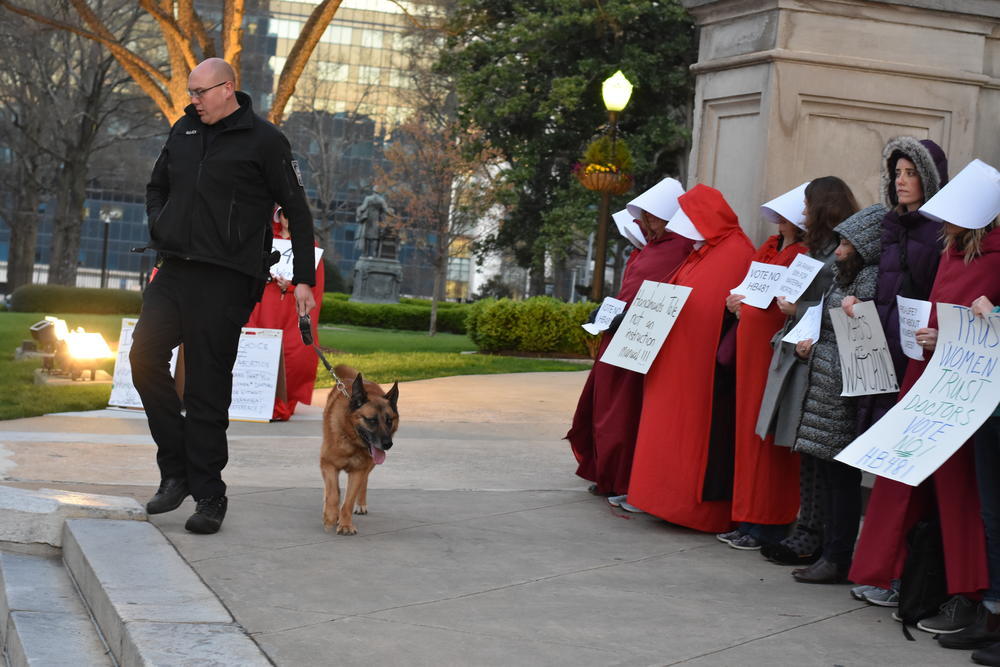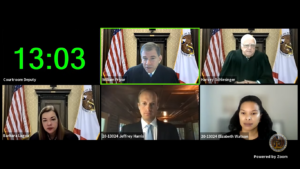
Caption
A group of women dressed like characters from the book and television show 'The Handmaid's Tale' hold signs during a protest in front of the state Capitol March 18, 2019.
Credit: GPB file photo
|Updated: October 16, 2021 8:50 AM

A group of women dressed like characters from the book and television show 'The Handmaid's Tale' hold signs during a protest in front of the state Capitol March 18, 2019.
A six-week abortion ban in Texas enacted in September forced those seeking abortion services in the Lone Star State to look across state lines for care.
But the timing couldn’t have been worse for Texans living near the state’s eastern border.
The law took effect as neighboring Louisiana was reeling from the destruction of Hurricane Ida, which shut down two of the state’s three abortion clinics for several days. The growing number of patients seeking help had to wait until the clinics could restore power, or travel hundreds of miles to other providers.
But that was just a preview of the obstacles that would emerge if the Supreme Court upholds a Mississippi law that bans most abortions after 15 weeks. For example, Louisiana’s own law would shift to the same 15-week ban, advocates say.
The landmark abortion case that will be heard by the nation’s top court on Dec. 1, Dobbs v. Jackson Women’s Health Organization, could spur a cascade of legal changes across two dozen states if justices back the restrictive Mississippi law — and potentially dismantle the landmark 1973 ruling affirming the right to an abortion.
Access would be most severely restricted in a long band of neighboring states stretching across the South and Midwest, according to the Center for Reproductive Rights, which is challenging the law.
The process would be far more time-consuming for those who have the means to travel elsewhere. And states with fewer restrictions would be bombarded with patients seeking out a shrinking number of providers.
The organization has identified 24 states as “hostile” to abortion rights, meaning those states could immediately or very quickly prohibit abortion. They have laws that were on hold but would automatically go into effect or could be enforced again, or lawmakers there are likely to attempt new bans.
Among those are: Arizona, Georgia, Idaho, Louisiana, Michigan, Missouri, North Carolina, Ohio, Pennsylvania, Tennessee, and Wisconsin.
The question presented, as I understand it, in (the Mississippi case), no matter which way the Supreme Court answers it – affirmatively or negatively – it seems to me that it’s going to bear directly on the correct outcome of this controversy.
A dozen states — including Louisiana, Tennessee, Missouri and Idaho — have “trigger laws” that would go into effect banning abortions if Roe v. Wade is overturned, according to the Guttmacher Institute, an organization focused on reproductive health and rights.
Michigan, Wisconsin, Arizona and five others still have abortion bans that pre-date Roe v. Wade on the books, which would become enforceable again if the precedent is overturned. That list shrunk by one earlier this year, when New Mexico repealed its pre-Roe ban.
On the opposite end of the spectrum are 15 states that have laws protecting the right to abortion, a tally that includes Maine, Maryland, Nevada and Oregon, according to Guttmacher.
In Kansas, a state Supreme Court decision in 2019 found the right to bodily autonomy embedded in the state Constitution guaranteed access to abortion. But state voters could change that next year, when a constitutional amendment will be on the ballot to reverse that ruling.
While the Mississippi case will be heard by a Supreme Court with a new conservative majority following the addition of Justice Amy Coney Barrett, it’s not clear that it will lead to a complete reversal of Roe.

A ruling on Georgia’s anti-abortion law will not come from the U.S. Court of Appeals for the 11th Circuit until after the Supreme Court has a chance to rule on an anti-abortion law out of Mississippi.
But a narrower ruling favoring the Mississippi law also would spur restrictions. A 2019 Georgia law that would outlaw most abortions once fetal cardiac activity is detected — about six weeks into a pregnancy and before many women know they are pregnant — has been on hold, pending the outcome of the Mississippi case.
“The question presented, as I understand it, in (the Mississippi case), no matter which way the Supreme Court answers it – affirmatively or negatively – it seems to me that it’s going to bear directly on the correct outcome of this controversy,” Chief Judge William Pryor for the Atlanta-based U.S. Court of Appeals for the 11th Circuit said late last month during a hearing on the Georgia case.
“It’s not every day that … we can allow the Supreme Court to do some work for us,” he also said.
Georgia’s law, which also includes a tax break for expecting parents and other so-called “personhood” provisions, has never taken effect. A federal judge blocked the law last year, which is a decision the state then appealed. Women can still access abortion services in Georgia until 20 weeks into a pregnancy.
Louisiana also has a pending law that’s nearly an exact replica of Mississippi’s 15-week ban, and it is explicitly tied to the outcome of the Mississippi case, said Michelle Erenberg, executive director of Lift Louisiana, which advocates for abortion access.
If the Supreme Court backs that neighboring ban, Louisiana’s pending 15-week law also will take effect.
“We’ve grown accustomed to this sort of ping-ponging back and forth, and waiting on judicial review and judicial rulings as these laws have made their way through state legislatures and through the courts,” Erenberg said. “But it is really difficult to feel that you can fully prepare for this inevitability.”
The Supreme Court’s recent rulings suggest it may support the Mississippi law, which was blocked by a lower federal court.
This story comes to GPB through a reporting partnership with Georgia Recorder.